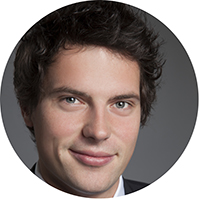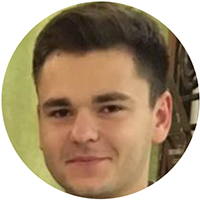Doing Business in Russia Continues to Attract Diverse and Talented Students
Last week, HSE’s Doing Business in Russia internship programme held an integration module for students who have completed their 6-month internships at German enterprises based in Russia and students who have just arrived in Russia. Those completing the programme presented group projects on a variety of topics, including project management, intercultural relations, and expat experiences. They also shared their impressions with new participants.
Developed in cooperation with the German Academic Exchange Service (DAAD) and the German-Russian Chamber of Commerce, the Doing Business in Russia programme combines practical experiences through internships with theoretical knowledge in the classroom in order to offer a wide-reaching introduction to Russia’s business culture.
Wolfgang Dik, ex-head of the Economic and Science Department at the German Embassy, says, ‘This programme makes a significant contribution to promoting Russian-German economic relations. Students from both countries will go on to form the future leadership of our societies’.
From the very start, the aim of the programme has been to bring young people to German enterprises that have operations in Russia. There are approximately 6,000 German enterprises in Russia and while there are German managers with considerable experience, there has been a lack of people from the younger generation. The programme therefore brings clear benefits for enterprises that are looking for a new generation of managers who know Russian and who are able to work in both cultures.
‘Young people want adventure, they want to see something new. If they go to Russia when they are young and stay here for a long period of time, they are linked to Russia for the whole life,’ says Karsten Heinz, an expert intercultural communications between Russians and Germans who supported the programme start. ‘The program widens their horizons and gives them a competitive advantage in the job market.’
Natalia Guseva, Professor at the Department of General and Strategic Management at the School of Business Administration, said that a record number of vacancies for the 2016 autumn semester was presented by German companies in Russia, but there was also a record number of applications from German students. The multi-stage competition was very tough. Some of the German students were even ready to study and pay the tuition themselves, which is a sign of the programme’s visibility.
One of the changes made to the introductory module has been the greater focus on interactive studies and business simulations, where students participate in the decision-making process and demonstrate their knowledge of both the theory and the practice of German companies’ operating in Russia.
Previous successful experience prompted the programme to implement a new ‘Neso Russia Internship Programme’ with partners from the Netherlands. The programme opens its first enrolment in October 2016, and in January 2017 the students will come to HSE.

Jerke Verschoor, Director at Nuffic Neso Russia — Netherlands Education Support Office, commented on this new initiative:
'Russia is an interesting country in many aspects, with a large economy strongly connected to the Netherlands but for many also a still unknown country. With this programme we hope that students get to learn about themselves, about working in a company within an international environment in a new country.
We will start small with perhaps 10 students next year, but the goal is to make this programme grow year by year. We begin with internships at Dutch companies or Dutch-managed companies in Moscow and St. Petersburg. If we see the programme works well and there is enough interest from students in the Netherlands, we will also look at other global and Russian companies.
We believe it will be very interesting. An internship is an important part of the curriculum and to be able to do an internship at a large Dutch company in a global city such as Moscow is a wonderful opportunity!'
Participants

Maximillian Langer
I found this HSE-DAAD programme an exclusive possibility for Germans to find a paid internship in Russia. We also have very interesting companies taking part, like Siemens and Bayer. This is why I joined the programme.
I want to work in the energy sphere, and Russia is of course the number one energy country on our continent. I travelled to Siberia two years ago – Russians are so hospitable;, they were inviting me to stay with them even though they didn’t really know me. It was such a great experience that I decided to come back.
I worked at Siemens in the strategy department. I was involved with market entry strategy for new technologies where we had to deal with localization strategy. We conducted analysis of what needs to be done. I was also working on energy technology, and was looking at exchange rates and oil price forecasts as well. We focused on other CIS countries to see what other projects Siemens could take part in there in the future.
For my Master’s thesis, which I need to write, I will continue working on the topic I started researching during my internship at Siemens – energy in Russia. In the future I may apply for a job in Russia.

Roman Gwosdilin
This programme is unique and convenient. They not only help to find an employer for an internship, but also help with all the paperwork, such as visas. We study at the university and get professional experience at the same time. This is an ideal solution today, and I’m very pleased that I’ve participated in it.
I worked in the strategic marketing department at Bayer where I learned a lot in professional terms about how marketing works. I studied how brands are managed, how marketing strategies are developed, how promotional videos are created, and how the architecture of the brand is built.
Despite the fact that the company is German, it has some features related to the fact that it operates in Russia. The employees have very close ties and often meet out of the office. I became friends with my colleagues and gained a number of new impressions. The programme also helps when it comes to establishing useful business contacts.
My experience of working in Russia and the Russian language skills I gained can be my competitive advantage in my future career. I can see myself as an expat employee in Russia at some point.
See also:
‘This Internship is a Great Start to an Academic Career’
This year, Angelina Yudina graduated from the Bachelor’s in Business Informatics at HSE University and enrolled in the Master’s in Economics and Economic Policy. She has also worked as a research assistant at the International Centre of Decision Choice and Analysis since May 2021. In her interview, Angelina spoke about her role and responsibilities as a research intern, the personal and professional skills she has developed, and her plans for the future.
Equality in Business: How Support from Loved Ones Can Reduce the Gender Gap
Galina Shirokova, Professor at the Department of Management at HSE University-St Petersburg, has worked alongside international researchers to identify the role of social circles and cultural values in the success of young businesswomen. They found that support within a group increases the chances of women engaging in entrepreneurship.
HSE Business Club Holds Its First Entrepreneurial Forum
This event was timed to coincide with Russian Entrepreneurship Day, which is celebrated on May 26. Forum attendees included not only students of HSE University, but also students from other Moscow universities. They were able to learn about internships in forum partner companies, as well as interacting in person with successful Russian business businesses.
Student Internship Programme at the
In April 2020, the Institute for Applied Political Studies (IAPS) launched an internship programme. Programme interns work together with Institute staff on joint projects, as well as acquire new research and communication skills. 40 students are currently participating in the programme
‘If You Don’t Try, You for Sure Will Not Succeed’: Eugene Kaspersky Visits HSE
At the invitation of the HSE Student Business Club, CEO, Russian cybersecurity expert, and Forbes-ranking billionaire Eugene Kaspersky visited HSE University to meet with students. Kaspersky discussed the founding of his renowned Kaspersky Lab, his experience entering the international market, and the role of all things digital in the world.
Ghost of Recession: Why It Is Haunting Russia's Economy
This year, a slowdown is expected in the Russian economy. According to some forecasts, the country will enter recession in 2021 or possibly even earlier. However, according to the HSE Centre for Business Tendencies Studies (CBTS), there are no noticeable signs of recession at the moment. This article looks at what keeps Russia's economy from picking up pace and why slowdowns are a possibility, according to the HSE CBTS.
SCO Headquarters and Peking Duck: HSE Lyceum Students’ Internship in China
This summer, students of Asian Studies at HSE Lyceum spent a month in China. They studied at Liaoning Normal University, visited ancient temples, and met the Shanghai Cooperation Organization (SCO) Secretary-General. The students spoke to HSE News Service about their trip.
Internship at HSE Centre for Psychological Counseling Kickstarts Careers
The HSE Centre for Psychological Counseling has been offering internships for master’s students in psychology for five years. Students from HSE, as well as from other universities, can get an internship. Here’s more information on how the programme works and the opportunities it offers.
Logic of Ignorance: Why Russian Oil Companies Are not Responsive to Environmental Concerns
Senior management of Russian oil companies lack environmental awareness and refuse to invest in environmental safety, according to Sofia Villo, who has examined the operations of Russia's major oil producer from an ecological perspective.
First National Educational Platform for Business Knowledge and Services Presented at the Festival of Youth and Students
A Russian nationwide educational online platform for entrepreneurs and to help develop infrastructure for the provision of public and commercial services based on a ‘one-stop-shop’ system, created by the Ministry of Economic Development together with Sberbank on the basis of the bank’s Business Environment online platform was presented on the last day of the youth festival. This platform is also known as the ‘National Knowledge and Solutions Platform’. HSE is a partner on the project.


